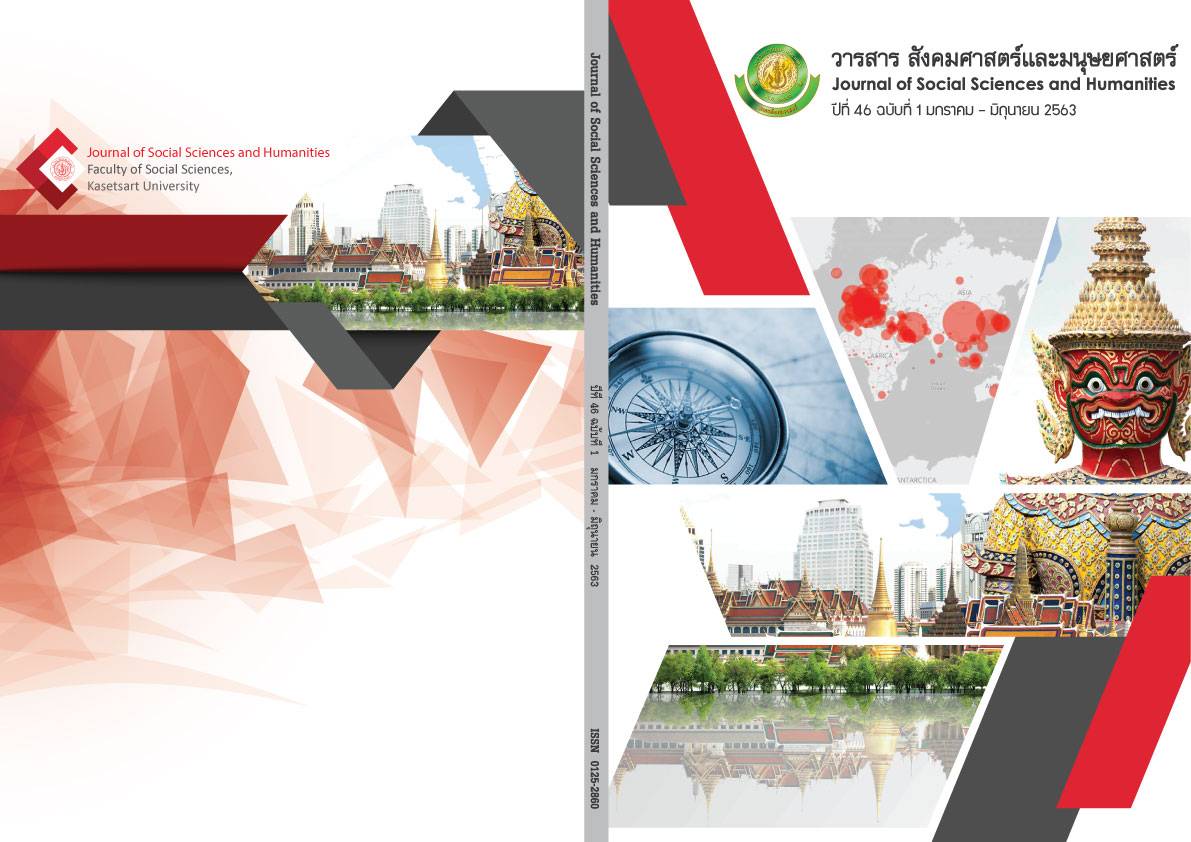ศึกษาเปรียบเทียบแนวคิดการตอบโต้การกระทำที่รุนแรงของ ฮันนาห์ อาเรนดท์ และ ฟรานซ์ ฟานอง
Main Article Content
บทคัดย่อ
แม้ว่าความรุนแรงเป็นสิ่งที่ควรละทิ้งตามความคิดของนักวิชาการสายประชาธิปไตยปัจจุบัน อย่างไรก็ตามงานของนักวิชาการผิวสีอย่าง ฟรานซ์ ฟานอง ก็ยังคงเป็นสิ่งที่นักวิชาการรุ่นหลังให้ความสนใจโดยเฉพาะข้อเสนอที่สร้างความตกตะลึงที่ว่าความรุนแรงเป็นสิ่งที่จำเป็นในการนำสังคมไปสู่ประชาธิปไตย เมื่อเป็นเช่นนั้นคำถามสำคัญจึงอยู่ที่ว่าในความคิดของฟานองเหตุใดความรุนแรงจึงเป็นสิ่งที่ดีหรือจำเป็น แตกต่างกับ ฮันนาห์ อาเรนดท์ เธอปฏิเสธการดำรงอยู่ของความรุนแรงและมองว่ากิจกรรมที่นำผู้คนไปสู่ความหายนะกับชีวิตดังเช่นฟานองปฏิบัติเป็นสิ่งที่ควรปฏิเสธและมองว่าเป็นสิ่งที่ผิดอย่างมหันต์หากปฏิบัติเช่นนั้น ด้วยแนวคิดที่ตรงกันข้ามของนักวิชาการทั้งสองเป็นสิ่งประกอบสร้างให้เกิดบทความชิ้นนี้ที่มุ่งแสดงความกระจ่างของความคิดของพวกเขาทั้งสอง
Article Details
รูปแบบการอ้างอิง
Nawakul, P. (2020). ศึกษาเปรียบเทียบแนวคิดการตอบโต้การกระทำที่รุนแรงของ ฮันนาห์ อาเรนดท์ และ ฟรานซ์ ฟานอง. วารสารสังคมศาสตร์และมนุษยศาสตร์ มหาวิทยาลัยเกษตรศาสตร์, 46(1), 18–43. สืบค้น จาก https://so04.tci-thaijo.org/index.php/socku/article/view/241965
ประเภทบทความ
บทความวิชาการ
เอกสารอ้างอิง
Alessandrini, Anthony C. “Introduction: Fanon Studies, Cultural Studies, Cultural Politics.” In edited by Anthony C. Alessandrini. (1999). Frantz Fanon: Critical Perspectives. London: Routledge.
Arendt, Hannah. (1951). The Origins of Totalitarianism. Florida, USA: The Harvest Book, Harcourt Brace & Company.
Arendt, Hannah. (1970). On Violence. New York, Harcourt, Brace&World.
Arendt, Hannah. (1998). The Human Condition. Chicago: University of Chicago Press.
Arendt, Hannah. (1990). On Revolution. London, England: Penguin Books.
Baehr, Peter. (2000). The Portable of Hannah Arendt. New York, USA: Penguin Books.
Bernstein, Richard J. (2013). Violence: Thinking Without Banisters. Cambridge, U.K.: Polity Press
Chomsky, Noam. (2000). Rogue States: the rule of force in world affairs. London: Pluto Press.
Chomsky, Noam. (1967). The Legitimacy of Violence as a Political Act? Noam Chomsky debates with Hannah Arendt, Susan Sontag, et al. December 15, 1967. (p. 1-8) http://www.chomsky.info/debates/19671215.htm
Dietz, Mary G. “Arendt and the Holocaust.” In edited by Dana Villa. (2000). The Cambridge Companion to Hannah Arendt. Cambridge, U.K.: Cambridge University Press.
Fanon, Frantz. (1963). The Wretched of the Earth, Jean-Paul Sartre (preface), Constance Farrington (translator). England: Penguin Books.
Fanon, Frantz. (1965). A Dying Colonialism, Haakon Chevalier (translator), Adolfo Gilly (introduction). New York: Grove Press.
Fanon, Frantz. (1969).Toward the African Revolution, Haakon Chevalier (translator). New York: Grove Press.
Gibson, Nigel C. (2003). Fanon: the Postcolonial Imagination. Cambridge, U.K.: Polity.
Kant, Immanuel. “Toward Perpetual Peace.” In Reiss. H. (Ed.). (1991). Kant: Political Writings, 2nd. Cambridge University Press.
Lawson, George. (2008). A Realistic Utopia?: Nancy Fraser, cosmopolitanism and the making of a just world order. Political Studies, 56 (4). pp. 881-906. ISSN 0032-3217
Mansfield, Edward D. and Snyder, Jack. (1995). Democratization and War. Foreign Affairs. May/Jun95, Vol. 74 Issue 3, p79-97. 19p. 5 Graphs. , Database: Business Source Complete.
Passerin d'Entreves, Maurizio. (1994). The Political Philosophy of Hannah Arendt. London: Routledge.
Strauss, Leo. (1959). What is Political Philosophy? and Other Studies. Free Press.
Villa, Dana (1999). Politics, Philosophy, Terror: Essays on the Thought of Hannah Arendt. Princeton, N.J.: Princeton University Press, c1999.
Villa, Dana. “The Development of Arendt’s Political Thought.” In edited by Dana Villa. (2000). The Cambridge Companion to Hannah Arendt. Cambridge, U.K.: Cambridge University Press.
Wellmer, Alblecht. “Arendt on revolution.” In edited by Dana Villa. (2000). The Cambridge Companion to Hannah Arendt. Cambridge, U.K.: Cambridge University Press.
Arendt, Hannah. (1951). The Origins of Totalitarianism. Florida, USA: The Harvest Book, Harcourt Brace & Company.
Arendt, Hannah. (1970). On Violence. New York, Harcourt, Brace&World.
Arendt, Hannah. (1998). The Human Condition. Chicago: University of Chicago Press.
Arendt, Hannah. (1990). On Revolution. London, England: Penguin Books.
Baehr, Peter. (2000). The Portable of Hannah Arendt. New York, USA: Penguin Books.
Bernstein, Richard J. (2013). Violence: Thinking Without Banisters. Cambridge, U.K.: Polity Press
Chomsky, Noam. (2000). Rogue States: the rule of force in world affairs. London: Pluto Press.
Chomsky, Noam. (1967). The Legitimacy of Violence as a Political Act? Noam Chomsky debates with Hannah Arendt, Susan Sontag, et al. December 15, 1967. (p. 1-8) http://www.chomsky.info/debates/19671215.htm
Dietz, Mary G. “Arendt and the Holocaust.” In edited by Dana Villa. (2000). The Cambridge Companion to Hannah Arendt. Cambridge, U.K.: Cambridge University Press.
Fanon, Frantz. (1963). The Wretched of the Earth, Jean-Paul Sartre (preface), Constance Farrington (translator). England: Penguin Books.
Fanon, Frantz. (1965). A Dying Colonialism, Haakon Chevalier (translator), Adolfo Gilly (introduction). New York: Grove Press.
Fanon, Frantz. (1969).Toward the African Revolution, Haakon Chevalier (translator). New York: Grove Press.
Gibson, Nigel C. (2003). Fanon: the Postcolonial Imagination. Cambridge, U.K.: Polity.
Kant, Immanuel. “Toward Perpetual Peace.” In Reiss. H. (Ed.). (1991). Kant: Political Writings, 2nd. Cambridge University Press.
Lawson, George. (2008). A Realistic Utopia?: Nancy Fraser, cosmopolitanism and the making of a just world order. Political Studies, 56 (4). pp. 881-906. ISSN 0032-3217
Mansfield, Edward D. and Snyder, Jack. (1995). Democratization and War. Foreign Affairs. May/Jun95, Vol. 74 Issue 3, p79-97. 19p. 5 Graphs. , Database: Business Source Complete.
Passerin d'Entreves, Maurizio. (1994). The Political Philosophy of Hannah Arendt. London: Routledge.
Strauss, Leo. (1959). What is Political Philosophy? and Other Studies. Free Press.
Villa, Dana (1999). Politics, Philosophy, Terror: Essays on the Thought of Hannah Arendt. Princeton, N.J.: Princeton University Press, c1999.
Villa, Dana. “The Development of Arendt’s Political Thought.” In edited by Dana Villa. (2000). The Cambridge Companion to Hannah Arendt. Cambridge, U.K.: Cambridge University Press.
Wellmer, Alblecht. “Arendt on revolution.” In edited by Dana Villa. (2000). The Cambridge Companion to Hannah Arendt. Cambridge, U.K.: Cambridge University Press.


